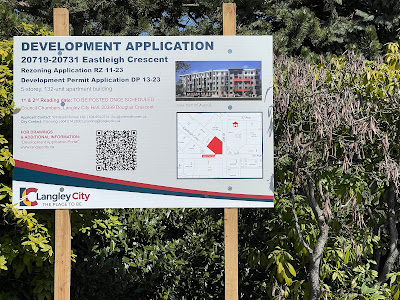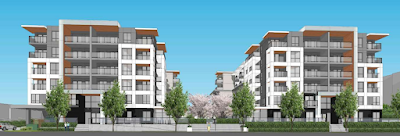As I mentioned last week, Langley City is rewriting its zoning bylaw. The zoning bylaw is one of the
primary ways that the City implements the policies of the Official Community
Plan.
The last major update of the zoning bylaw occurred in 1996. I was in grade 7
at the time, and Langley City had a population of 22,523. The needs of 1996
Langley City are different than today, and over the years, the current zoning
bylaw has become a bit of a Frankenstein's Monster of a document.
One of the primary goals of the rewrite is to simply and modernize the zoning
bylaw. This simplification includes reducing the number of zoning.

|
|
Map of Langley City with new draft zones. Select the map to enlarge.
|
The new zoning bylaw also thoroughly bakes in all the recent provincial
government changes, such as transit-oriented areas and the ability to build up
to four units of housing on any residential lot in the City. The new zoning
bylaw also enables the addition of inclusionary zoning and density bonusing in
the future, which allow the City to leverage private development to build
below-market rental units.
Within our residential zoning, the zoning bylaw will enable detached homes,
duplexes, triplexes, quadplexes, carriage homes, garden suites, and secondary
suites.
Without limiting the ability to build quadplexes with at least 50 m² per unit
in accordance with provincial guidance, the zoning bylaw also encourages less
boxy designs of housing up to three stories in height. You can build up to
three stories today in Langley City on any residential lot.
The zoning bylaw also requires that a minimum of 5 percent of all units in
apartment zones have three or more bedrooms.
The zoning bylaw also reduces the parking requirements for below-market rental
units and boosts the number of required bike parking spots in transit-oriented
areas.
The zoning bylaw also enables more zones that permit childcare.
We know that there are many "spas" in the City, which, in our new draft zoning
bylaw, are called "Personal Health Enhancement Centres." The zoning bylaw bans
this use outright (though existing spas are grandfathered.) As a note, RMTs,
hair and nail salons, and barber shops are not included in the "Personal
Health Enhancement Centres" definition.
The zoning bylaw is in draft form, and the City is now seeking feedback from
our community,
as I noted in a previous post.
If Council approves the new zoning bylaw, just like today, rezoning would
still be required in many cases.
You can read the draft zoning bylaw
on Langley City's website.






























